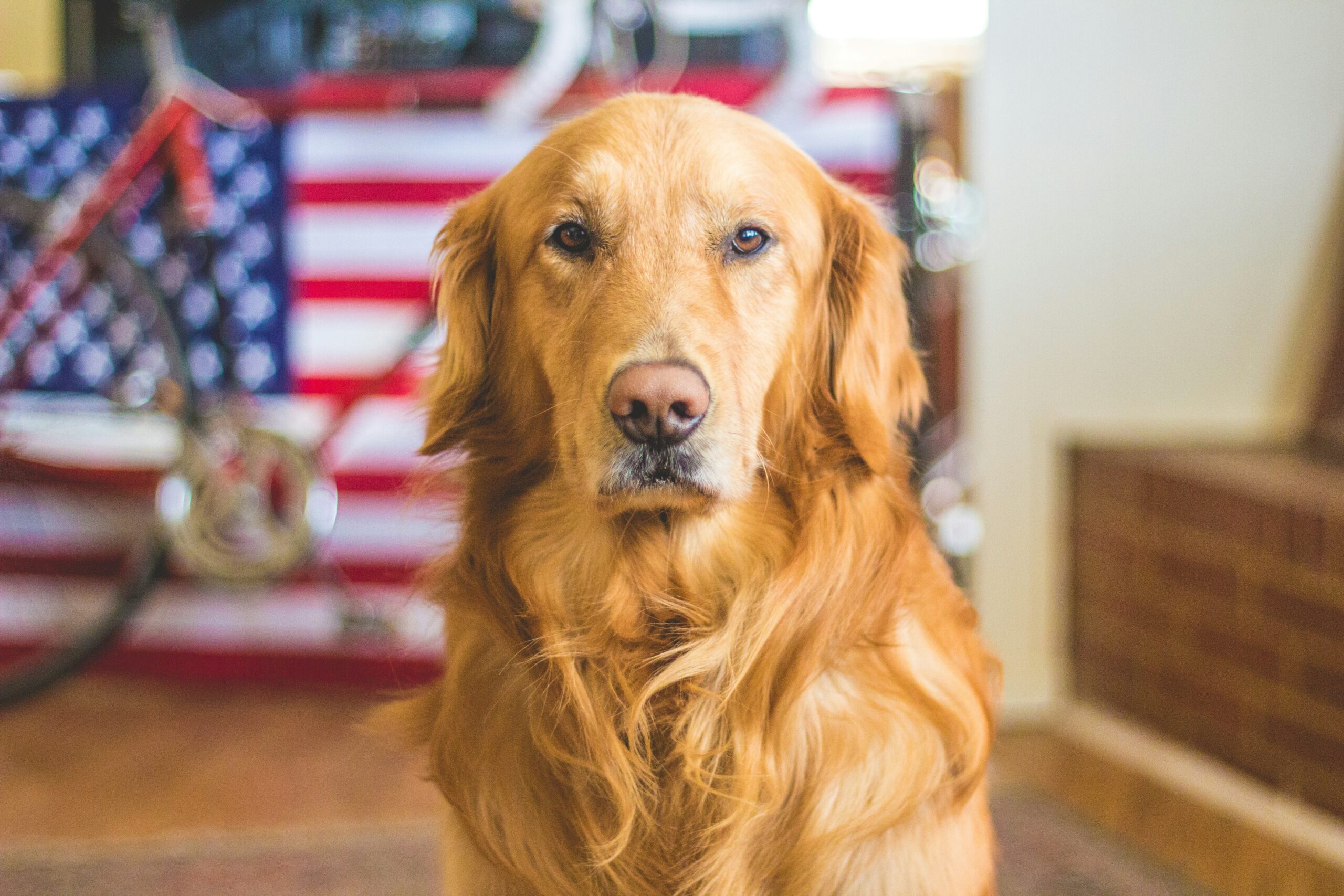Like humans, many dogs have anxiety. In this guide on dog anxiety, you will learn how to calm down a dog quickly and effectively.
Few nations love dogs as much as we do in America.
There are almost 90 million hounds kept in happy houses all over the country! That, of course, is a huge number of pet pooches! But it’s no surprise…
After all, they’re called man’s best friend for a reason! Dogs are adorable, loyal, happy animals that love their owners as unconditionally as we love them.
But did you know that dogs get anxious as well? That’s right, hounds, just like humans, can suffer from frequent bouts of debilitating anxiety. That’s why knowing how to calm down a dog that’s anxious is so important if you’re a dutiful dog owner.
Don’t forget that anxiety can be reactions to everything from loud noises to change and separation that can lead to shivering, pacing, cowering, howling, and even self-harming. Looking for tips and tricks to calm down your whining, pining pooch? Read on to learn 10 ways to calm down dogs with anxiety.
1. Know Thy Furry Friend
A key step to mitigating anxiety (whether you’re a human or hound) is to understand it first.
Knowledge and awareness are naturally empowering. By understanding what’s going on you can do something about it!
Start the process of helping your pooch’s anxiety by getting curious about it. Identify how they express their anxiety, warning signs that appear beforehand, triggers that set it off, and anything that relieves it too.
With that insight behind you, it’ll be far easier to a) prevent them from getting anxious in the first place, and b) calm them down when they do.
2. Avoid the Triggers
Figuring out what triggers your dog’s anxiety means you can take steps to avoid it/them.
For example, maybe they get anxious around other dogs in your neighborhood. You could then accommodate that by walking them in other places. Likewise, if they get anxious at being left at home all day, you could hire a pet sitter to stay with them while you’re out.
Whatever the case might be, avoiding the triggers of your dog’s anxiety can be a helpful short-term solution. From there, it’s a matter of working out more long-lasting strategies for helping them overcome it.
3. Get a Professional Opinion
It’s worth paying a visit to your dog’s vet as well.
After all, who’s to say their anxiety isn’t the result of an underlying medical condition? There might be a purely physical explanation behind the behavioral changes you’ve noticed.
Finding this out early serves two purposes:
Firstly, it stops you from squandering time and effort on an ill-fated search for anxiety treatments! Secondly, it could uncover serious physical health issues that need immediate intervention.
Either way, the vet will be able to investigate and get to the bottom of the issue. Better still, they’ll be able to offer professional guidance on how to relieve your dog’s anxiety if that does end up being the problem!
4. Take Them on Lots of Walks
Every dog owner knows the importance of regularly exercising their pooch.
It’s downright essential for keeping them fit and healthy—ensuring they have a long and happy life. Of course, it also helps to wear them out and stop them causing trouble in the house!
Yet many owners don’t realize that exercise calms down anxious dogs as well.
It’s a preventative approach, which helps to reduce levels of nervous energy and produce mood-lifting endorphins. Giving your pooch plenty of exercise also means you’re spending time together. That facilitates the bond and should make it easier when it comes to leaving them alone.
All told, dogs come away from walks feeling more secure and less stressed. The result? They should respond less anxiously to stimuli and situations that would normally trigger them.
If you are concerned your dog may get loose while taking a walk, having a pet tracker will ensure you can find them.
5. Give Them Lots of Cuddles
There’s nothing like a cuddle to make you feel better when you’re stressed, right?
That’s true for humans and hounds alike! You just can’t help but feel pacified and soothed by it. Your heart rate slows down, your mind stops racing, and a feeling of calm spreads over your body.
A similar effect takes place when you cuddle a dog that’s anxious.
As you know, all pet pooches love getting lots of pats and cuddles. However, they’re particularly beneficial for anxiety-prone animals! It releases something called oxytocin (sometimes known as the ‘love hormone’) in both your brain and theirs, which feels fantastic and strengthens the bond between you.
The physical contact helps reassure, relax, and comfort the dog whenever they start to feel anxious. Always be quick to offer affection whenever you spot them becoming unsettled. It’s a great way to curb their anxiety and help them calm down.
6. Give Them Mini Doggy Massages
Yep, you read that correctly: dogs like massages too! Especially if they’re anxious.
Massages provide all the same benefits to dogs as they do humans. They relieve any tension that’s built up in those strong doggie muscles and reduce stress levels at the same time.
With one hand lightly on your dog’s neck, use your other to stroke down along the length of their body. You’ll soon realize the right amount of pressure to apply, as well as the areas of their body that hold the most tension.
7. Play Them Music
Music’s another well-known (if underused) antidote for calming down anxious dogs.
It’s the same for humans, of course. There’s a well-established connection between music and emotion. Different styles and sounds elicit equivalent physical and emotional reactions when we hear them.
We can all relate to the wonderful effects of calming music on our minds and bodies. Worries ebb away whenever soothing music reaches our ears through the airwaves.
Amazingly, dogs seem to have a similar reaction. Their heart rates slow down, they bark less than usual, and they have less cortisol (the stress hormone) in their system. In other words, they’re not as anxious!
Music doesn’t just help in a curative way though. You can use it to prevent your dog from getting anxious in the first place.
Let’s imagine that your hound suffers from separation anxiety. Playing relaxing tunes in your house should make them less stressed when you come to say goodbye!
8. Create a Safe Space
Some dog owners dislike the idea of isolating anxious pets.
Yet it’s often the lesser of two evils.
Your poor pooch might have worked itself into a nervous frenzy. With their behavior becoming ever more erratic and stress levels increasing, putting them somewhere for a time-out can be a saving grace.
That’s particularly true if your dog gets disturbed by loud noises. Putting them in a quiet room that shuts out external sounds can provide a valuable reprieve that reduces their anxiety.
In truth, many dogs with anxiety appreciate having a safe space to which they can retreat. You can even purchase specially-designed crates that are cool, quiet, and devoid of any other anxiety-provoking stimuli. Consider investing in something like this if your dog gets easily overwhelmed by their environment.
Some dogs need to feel confined to feel safe and others need more space. Dogs can be trained to accept smaller areas, if necessary, in which they can calm down. Laika, the first dog in space, was trained to go into an area the size of a washing machine in order to be sent into space.
9. Dress Them in Calming Clothes
Have you ever heard of calming blankets?
They’re heavy, weighted quilts designed to help people who suffer from anxiety, stress, and insomnia sleep better at night. The heaviness of the blanket makes you feel as if you’re being hugged, which has a natural soothing effect.
A similar principle applies to calming doggie clothing!
These days, you can buy ‘shirts’ and ‘coats’ that apply soft pressure around your furry friend’s body. It’s a bit like they’re being hugged, which helps soothe and calm them down.
The cause of a dog’s anxiety shouldn’t make a difference here either. Whether they struggle with separation, loud noises, or being put in their crate, having a calming coat on is known to help.
10. Supplements and Alternative Therapies
It might be worth considering anxiety-reducing doggie supplements and therapies too.
From homeopathic remedies and aromatherapy to CBD chew toys, there’s no shortage of alternative ways to control pet anxiety. Though scientific evidence is sometimes lacking, you’ll find plenty of anecdotal support for their usage.
If everything else has failed, then natural, non-invasive alternatives might be worth a try! Be sure to check with your vet before administering any supplements though. They’ll a) make sure it’s suitable for your pooch and b) suggest better ones for the task if not.
Exactly How to Calm Down a Dog With Anxiety
Dogs bring oodles of love and joy to any household that’s lucky enough to own one.
Unfortunately, though, having a pet pooch isn’t always easy! Dog anxiety, for instance, is a common issue that can lead a host of challenging behaviors to arise.
Knowing how to calm down a dog with anxiety can be tough. Thankfully, though, there’s a wide range of tools, strategies, and interventions that can help. We hope the suggestions above will come in handy in this regard.
Want to read more articles like this one? Search the ‘Pet Health’ section of the website now!

